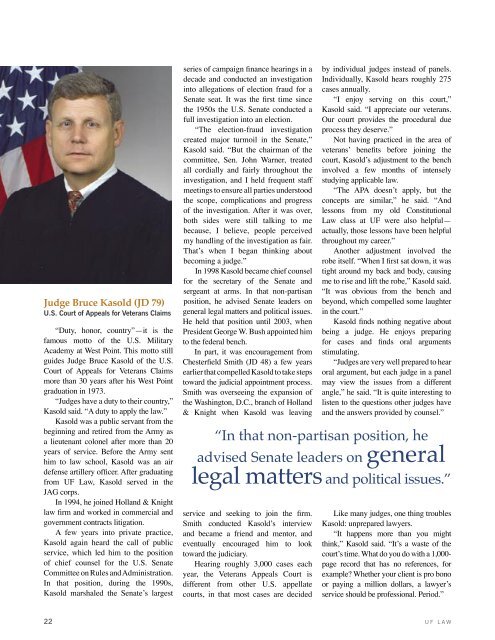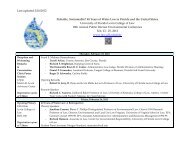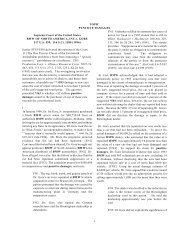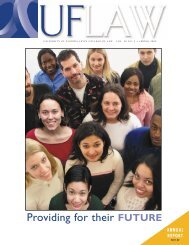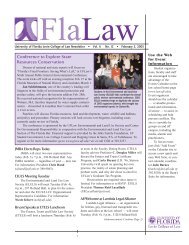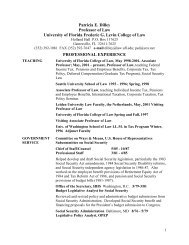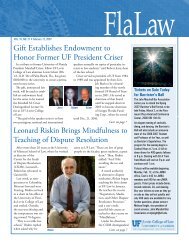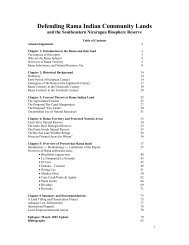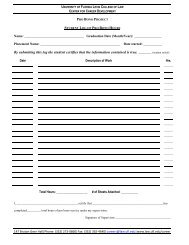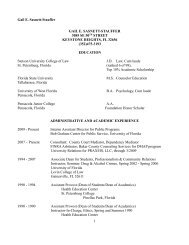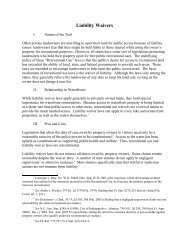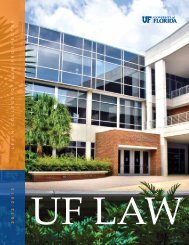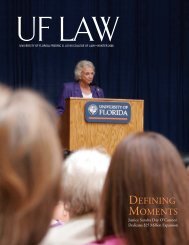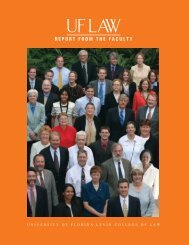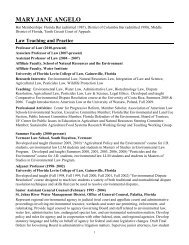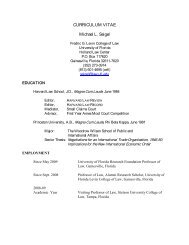Download Magazine - Levin College of Law - University of Florida
Download Magazine - Levin College of Law - University of Florida
Download Magazine - Levin College of Law - University of Florida
Create successful ePaper yourself
Turn your PDF publications into a flip-book with our unique Google optimized e-Paper software.
Judge Bruce Kasold (JD 79)<br />
U.S. Court <strong>of</strong> Appeals for Veterans Claims<br />
“Duty, honor, country”—it is the<br />
famous motto <strong>of</strong> the U.S. Military<br />
Academy at West Point. This motto still<br />
guides Judge Bruce Kasold <strong>of</strong> the U.S.<br />
Court <strong>of</strong> Appeals for Veterans Claims<br />
more than 30 years after his West Point<br />
graduation in 1973.<br />
“Judges have a duty to their country,”<br />
Kasold said. “A duty to apply the law.”<br />
Kasold was a public servant from the<br />
beginning and retired from the Army as<br />
a lieutenant colonel after more than 20<br />
years <strong>of</strong> service. Before the Army sent<br />
him to law school, Kasold was an air<br />
defense artillery <strong>of</strong>ficer. After graduating<br />
from UF <strong>Law</strong>, Kasold served in the<br />
JAG corps.<br />
In 1994, he joined Holland & Knight<br />
law firm and worked in commercial and<br />
government contracts litigation.<br />
A few years into private practice,<br />
Kasold again heard the call <strong>of</strong> public<br />
service, which led him to the position<br />
<strong>of</strong> chief counsel for the U.S. Senate<br />
Committee on Rules and Administration.<br />
In that position, during the 1990s,<br />
Kasold marshaled the Senateʼs largest<br />
series <strong>of</strong> campaign finance hearings in a<br />
decade and conducted an investigation<br />
into allegations <strong>of</strong> election fraud for a<br />
Senate seat. It was the first time since<br />
the 1950s the U.S. Senate conducted a<br />
full investigation into an election.<br />
“The election-fraud investigation<br />
created major turmoil in the Senate,”<br />
Kasold said. “But the chairman <strong>of</strong> the<br />
committee, Sen. John Warner, treated<br />
all cordially and fairly throughout the<br />
investigation, and I held frequent staff<br />
meetings to ensure all parties understood<br />
the scope, complications and progress<br />
<strong>of</strong> the investigation. After it was over,<br />
both sides were still talking to me<br />
because, I believe, people perceived<br />
my handling <strong>of</strong> the investigation as fair.<br />
Thatʼs when I began thinking about<br />
becoming a judge.”<br />
In 1998 Kasold became chief counsel<br />
for the secretary <strong>of</strong> the Senate and<br />
sergeant at arms. In that non-partisan<br />
position, he advised Senate leaders on<br />
general legal matters and political issues.<br />
He held that position until 2003, when<br />
President George W. Bush appointed him<br />
to the federal bench.<br />
In part, it was encouragement from<br />
Chesterfield Smith (JD 48) a few years<br />
earlier that compelled Kasold to take steps<br />
toward the judicial appointment process.<br />
Smith was overseeing the expansion <strong>of</strong><br />
the Washington, D.C., branch <strong>of</strong> Holland<br />
& Knight when Kasold was leaving<br />
service and seeking to join the firm.<br />
Smith conducted Kasoldʼs interview<br />
and became a friend and mentor, and<br />
eventually encouraged him to look<br />
toward the judiciary.<br />
Hearing roughly 3,000 cases each<br />
year, the Veterans Appeals Court is<br />
different from other U.S. appellate<br />
courts, in that most cases are decided<br />
by individual judges instead <strong>of</strong> panels.<br />
Individually, Kasold hears roughly 275<br />
cases annually.<br />
“I enjoy serving on this court,”<br />
Kasold said. “I appreciate our veterans.<br />
Our court provides the procedural due<br />
process they deserve.”<br />
Not having practiced in the area <strong>of</strong><br />
veteransʼ benefits before joining the<br />
court, Kasoldʼs adjustment to the bench<br />
involved a few months <strong>of</strong> intensely<br />
studying applicable law.<br />
“The APA doesnʼt apply, but the<br />
concepts are similar,” he said. “And<br />
lessons from my old Constitutional<br />
<strong>Law</strong> class at UF were also helpful—<br />
actually, those lessons have been helpful<br />
throughout my career.”<br />
Another adjustment involved the<br />
robe itself. “When I first sat down, it was<br />
tight around my back and body, causing<br />
me to rise and lift the robe,” Kasold said.<br />
“It was obvious from the bench and<br />
beyond, which compelled some laughter<br />
in the court.”<br />
Kasold finds nothing negative about<br />
being a judge. He enjoys preparing<br />
for cases and finds oral arguments<br />
stimulating.<br />
“Judges are very well prepared to hear<br />
oral argument, but each judge in a panel<br />
may view the issues from a different<br />
angle,” he said. “It is quite interesting to<br />
listen to the questions other judges have<br />
and the answers provided by counsel.”<br />
“In that non-partisan position, he<br />
advised Senate leaders on general<br />
legal matters and political issues.”<br />
Like many judges, one thing troubles<br />
Kasold: unprepared lawyers.<br />
“It happens more than you might<br />
think,” Kasold said. “Itʼs a waste <strong>of</strong> the<br />
courtʼs time. What do you do with a 1,000-<br />
page record that has no references, for<br />
example Whether your client is pro bono<br />
or paying a million dollars, a lawyerʼs<br />
service should be pr<strong>of</strong>essional. Period.”<br />
22 U F L A W


